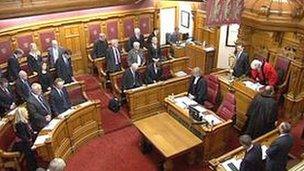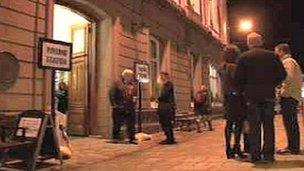Jersey referendum: How it will work
- Published

Proposals for changes to the States are being put to the public
People in Jersey will be asked to vote in a referendum at the end of April for only the second time in the island's history.
The outcome of the referendum will define how many politicians there are, how they are elected and the size of constituencies.
In 2012 the States of Jersey set up an electoral commission to look at reforming the way politicians are elected and come up with referendum questions to be put to the public.
Chairman of the commission, Senator Sir Philip Bailhache, said the States needed the referendum as it was incapable of self reform.
Under the current system there are 51 members of the States of Jersey elected for four years, representing anything from 1,200 to 98,000 constituents.
There are three types of politician: deputy, constable and senator.
A deputy is the closest to a UK MP, elected to represent a district of between 1,200 and 3,000 residents.
A constable is the head of one of Jersey's 12 parishes. The role is closer to a UK mayor.
And a senator is the island wide representative - elected by all eligible voters in Jersey and the first two chief ministers have come from the senatorial benches.
There are currently 10 senators but reforms already in motion will see that number drop to eight next year.
At the last election in 2011 average turnout for the constable elections was 48.6%, for deputies it was 47.9% and 48.4% for the senators elections.
The referendum will feature three options and, as an alternative vote election, people will be asked to rank their choices.
Islanders vote by putting a 1 next to their preferred option and a 2 next to the second favourite, although it is not essential to use the second preference.
On election night volunteers at each polling station will put ballot papers in one of three piles depending on the first preference shown.

Average turnout in the 2011 election was under 50%
They then have to wait until the last of the parishes finish counting before the first island-wide preference is known.
If one option has gained over 50% of the vote that will be the winner and the counting will be over. If not then the votes will be re-counted based on second preference.
At this point there will be two piles of ballot papers left and the option with the most votes will win.
Michael de la Haye, Greffier of the States, said: "It is important to stress that every voter only has one vote counted in the final count.
"Second preferences are only counted if your first preference vote is for the option that gets the fewest votes and, if that happens, your second preference vote is counted as part of the final count."
Campaign groups
The A Team is a campaign group pushing for Option A, and say it is the only option that is simple, fair and equal.
Sam Mezec from the group said: "For the first time, all islanders will have an equal say in how the States is made up, no matter where they live. It is the only democratic way forward."
Former senator Ben Shenton heads up the group supporting Option B.
He said: "It is very important we have a system where people at parish level have representation. By removing the constables from the States you remove that."
Lyndon Farnham supports Option C, which involves keeping things as they are now.
He said: "Option C is the only option that protects the parishes, keeps the constables and saves the senators.
"Do we really want to lose the island-wide mandate? It is the most representative elected office and therefore the most democratic."
Daniel Wimberley, a former deputy, who persuaded the States to set up the commission for a referendum on reform, said it had been fudged.
He said people in Jersey still could not choose their government and the options would not make the changes islanders wanted.
Expert in Jersey politics, Adrian Lee, said he doubts the outcome of the referendum will make a difference as turnout was likely to be so low the States would be able to ignore it.
Islanders vote in the referendum on 24 April and polls are open from 08:00 to 20:00 BST.
Jersey's first referendum was in 2008 and asked if Jersey should move to Central European Time from GMT. That was rejected 17,230 votes to 6,564.
- Published15 March 2013
- Published14 March 2013
- Published20 February 2013
- Published19 February 2013
- Published4 January 2013
- Published20 October 2011